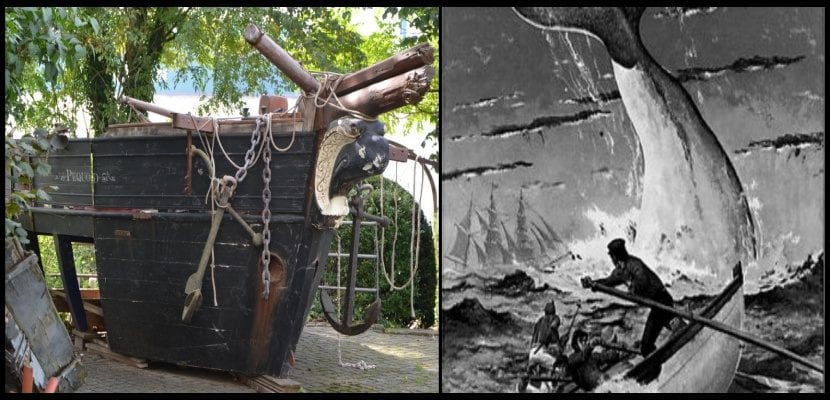
Replica of pequod. From the German TV series Moby Dick (2006)
Last September 28 was the 125th anniversary of the death of American writer Herman Melville. Its best known creature, Moby Dick, is the most famous whale in world literature and synonymous with the most dangerous and exciting adventures at sea. And I, possibly because I'm from arid inland, I have some blood from the sailor Ishmael, the pirate John Silver the Long and Captain Jack Aubrey.
With them I have traveled seas and oceans chasing more whales, monsters and various enemies. I have crossed gales at Cape Horn, touched a hundred ports in Mauritius or the Tortoise and found immeasurable treasures. Because imagination, fantasy, the emotion of risk, of victory and defeat, of flight or the heat of battles are priceless. But I couldn't have lived that long if I hadn't shipped in their ships as mythical as they. It's impossible to list everyone I've served so I'm sticking with those three. If you want to accompany me, Let's get on board the first one: the pequod.
El pequod
The fictional pequod, a brig whose davits are made of whale bone, was based on the whaler Essex, which in 1820 was attacked by a sperm whale. The few survivors spent 95 days at sea after the ship sank and had to resort to cannibalism. Melville, who was also a whaler, learned of the stories of those unfortunate people. His ordeal ended up inspiring one of the greatest adventure novels ever written.
In my childhood I possibly saw the most classic films of Moby Dick y The island of the treasure before reading the novels. And more than the argument, what impressed me the most were the figures, profiles and designs of the sailing ships. That and the nautical language. Then it turned out that the story was just as fascinating as they were. A Moby Dick you have to add an extra fear of the gigantic white whale, an allegory of evil and all the monsters that persecute the human being.
But perhaps Captain Ahab inspired even more fear., an even greater symbol that that evil and those monsters can be ourselves. Rarely has the human condition been better described when it is taken over by hatred, resentment, and the obsession to carry out revenge at any cost.
At the cinema
And if something can accompany the imagination, it is its recreation through cinema. With adventures they have it easy. Adaptations of Moby Dick to the big screen are innumerable, but I think that the collective memory remains with the one made by John Huston in 1956. Legendary director, Hollywood's golden age, a spectacular cast… From my humble perspective the later versions pale next to this one.
The last, In the heart of the sea (Ron Howard, 2015), the most faithful to the real history of the Essex and full of special effects, yes, very spectacular, but no, it is not Huston's. And certainly not a superb Gregory Peck as Captain Ahab. Not an Orson Welles or a Leo Genn like Mr. Starbuck or a James Robertson Justice. Impossible to be more classic.
As a curiosity, in Huston's version, the pequod It was a schooner from 1870. Part of the filming was in Gran Canaria, in Las Palmas and Las Canteras beach, in 1954. So seeing Huston and Peck there at that time was quite an event. Y Gregory Peck has seldom been better at the movies than playing the bland, disturbed and violent Captain Ahab.
Why board the pequod
Because you are assured of the most disturbing and terrifying journey you can imagine. Because you will ask for mercy under the storms and you will not be able to tire of the immensity of the sea, all the unknown it represents and the power of its creatures. But mostly because You will be shocked to discover that the most threatening, dangerous and terrible thing is yourself. If you know how to accept it and you are lucky, you will survive, you will return and you will be able to tell about it. Like Ismael.